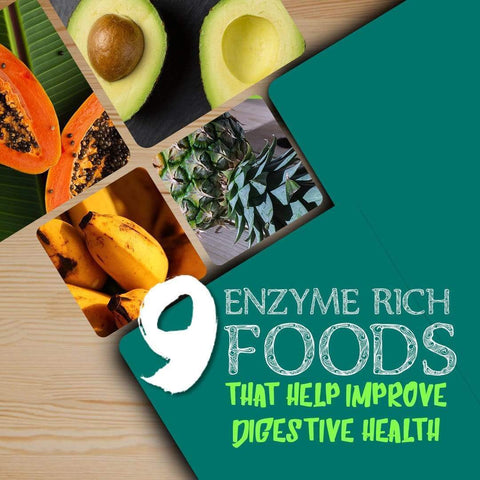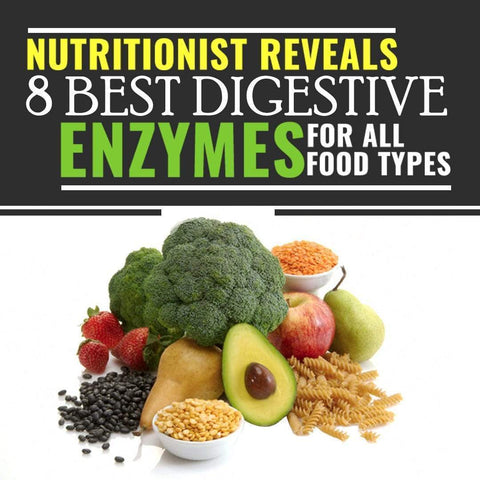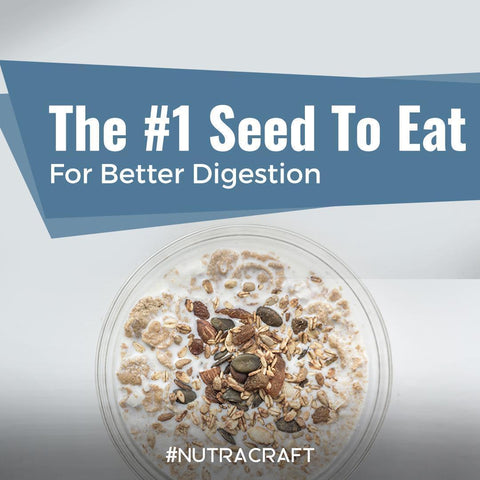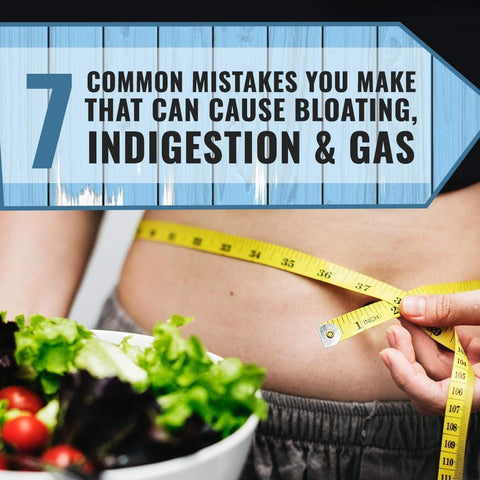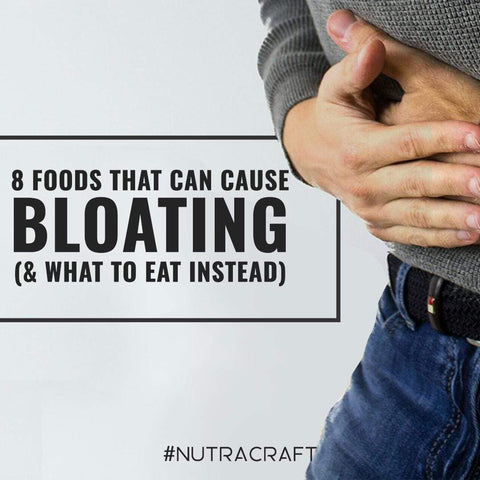
Digestive enzymes are produced by your pancreas in order to break down the protein, carbs, and fats you eat.
These macromolecules are broken down to generate simple sugars, amino acids, cholesterol, fatty acids, and nucleic acids that are used to build tissues and create other metabolic compounds like hormones in your body.
The Consequences of Not Producing Enough Enzymes
Your food has to be broken down efficiently for your gut to be healthy. If you're not properly digesting the protein, carbs, and fats you’re eating, it can cause a huge disruption in your intestinal health. Improperly digested food can cause inflammation and alter the “ecosystem” of the gut, the delicate balance of bacteria that keeps your gut functioning healthily 1.
In addition, the inflammation that undigested food causes interferes with the absorption of vitamins and minerals 1. The result is that all of your cells suffer from not getting the fuel they need to perform.
The Three Core Enzymes (Protease, Amylase, and Lipase)
Stomach acid, bile, and digestive enzymes are needed to properly break down food, yet some people don’t produce enough enzymes to break down food.
You need protease to break down proteins amylase to break down carbohydrates, and lipase to break down fats.
Without enough of these enzymes, you won’t absorb your food, and your intestinal health will suffer.
For those who could benefit from them, these digestive enzymes can be supplemented. As people age, they produce less of these enzymes, and many practitioners think that our modern lifestyles and diet of cooked and processed foods deplete us of these enzymes. Those with digestive issues could benefit from supplementing with enzymes so that they are properly absorbing food and not stressing their intestinesƚ.
Exclusive Bonus! Download the FREE report ‘How to Eliminate Bloating & Digestive Upset in 3 Steps’ by clicking here.
Other Enzymes
Besides amylase, protease, and lipase, there are numerous other enzymes that break down specific components in foods that are also therapeutic.
They all are evidenced to break down food more easily and fight the inflammation that usually occurs alongside digestive troubles and interferes with digestion.
The Research: Let’s Take a Look
1. Proteases

After you eat food, your body breaks down proteins into their individual components, amino acids. Proteases break down these proteins so that you can assimilate amino acids.
Because of this improved assimilation, researchers suggest that proteases can help relieve the symptoms of “various digestive disorders” 2ƚ. If you’re breaking down the proteins you eat more effectively, it makes sense that you would experience less digestive distress from undigested food particles.
2. Lipase
Your body needs fat. This macronutrient is used to generate hormones and build protective membranes of your cells.
Lipase helps process and properly absorb the fats you eat. If your body is not absorbing fats, your bowel movements might leave oily residues.
If your pancreas is not producing enough lipase and you're not absorbing fats, lipase supplementation is the standard therapy 3ƚ. Evidence has shown that lipase supplementation reduces the uncomfortable fullness that results from digestive stress after high-fat meals 4ƚ.
3. Glucoamylase

This enzyme digests the glucose in starch found in grains, potatoes, and vegetables. Your body produces glucoamylase in your mouth and pancreas to liberate and absorb the simple glucose molecules from the complex chains they are bound to in starch.
Research has evidenced that glucoamylase supplementation does indeed improve starch absorptionƚ. Researchers knew because more glucose was absorbed into the blood because of the glucoamylase enzyme 5ƚ.
4. Bromelain
Bromelain is an enzyme in pineapple that is incredibly therapeutic. The evidence shows that bromelain puts a stop to inflammation and digestive distressƚ.
In a clinical trial, an enzyme supplement that included bromelain led to “symptomatic improvements in pain, flatulence and stool frequency” 6ƚ. Researchers say additional evidence shows that bromelain has been “administered successfully as a digestive enzyme to treat intestinal disorders” 6ƚ.
Considering bromelain’s abilities to digest proteins and stop inflammation, it’s little wonder it's so effective in stopping pain and gasƚ.
5. Phytase

Phytic acid is an anti-nutrient found in plant foods, and it can interfere with the absorption of vitamins, minerals, and starch.
Fortunately, phytase does improve digestion and the breakdown of phytate so that nutritional components can be more easily digested 7ƚ.>
6. Xylanase
This enzyme breaks down hemicellulose, one of the main cell wall components from plants.
As a result of taking xylanase, you can more easily assimilate the nutrients found inside plant cellsƚ. And research has shown that xylanase supplementation does indeed improve nutrient absorption 8. Also, in animal studies, there’s evidence that xylanase can improve the digestion of wheat and decrease cellular damage and stress in the digestive tract <9ƚ.
7. Lactase

So many of us are lactose intolerant or have trouble digesting dairy products. It’s estimated that around 75% of the world’s population doesn’t produce enough of the enzyme lactase which helps digest the lactose sugar in milk 10. In these cases, lactose is not absorbed and causes discomfort and pain in the digestive tract.
But the good news is that if you’re consuming dairy and you supplement with lactase, you will have a much better time breaking down the lactose in dairy 10,11ƚ.
8. Aspergillopepsin
Researchers say this enzyme has the ability to “detoxify” gluten (a protein found in wheat and barley) 13ƚ. As you probably know, many people are allergic or have digestive troubles caused by gluten. Researchers hope that further studies can prove that this enzyme can relieve the symptoms of people with gluten intolerance 13ƚ.
9. Papain
Papain is an enzyme in papaya. It’s sometimes coupled with bromelain in supplements because it has anti-inflammatory and digestion-soothing effectsƚ. Papain improves symptoms of constipation and bloating 14, and it helps digest proteins and curbs inflammation, which means a happier gut for youƚ.
Digestive Enzymes Can Improve Your Overall Health
Digestive enzymes can affect how well you absorb nutrients, how your guts feel, and how much inflammation is in your bodyƚ.
Researchers have found “significant improvement in emotional response, general impression autistic score, general behavior and gastrointestinal symptoms” 12ƚ. That’s a big find! You feel better mentally and physically, and your digestion improvesƚ. For many people, these improvements can be life-changers.
Got heartburn, bloating, gas or constipation?
They’re all tell-tale signs of digestive issues that go beyond a spicy meal or not enough fiber in your diet.
They’re your body’s way of crying out for help. Digestive issues can happen when your body’s natural digestive enzymes are out of whack.
Fortunately, DigestEzy by Nutracraft can help. Formulated with a specific blend of digestive enzymes that help your body absorb nutrients and process everything from milk proteins to plant fiber, DigestEzy puts your digestive process back in its natural balance without harsh side effects or chalky aftertasteƚ.
Don’t wait another day to experience the relief you deserve. With 1000s of satisfied customers, a 5-star rating, and our Nutracraft ‘Empty Bottle’ money back guarantee, you have nothing to lose.





